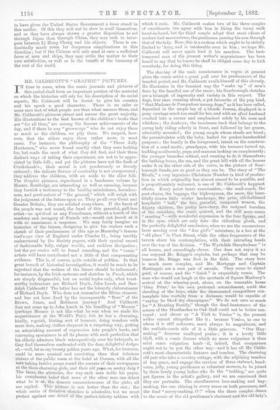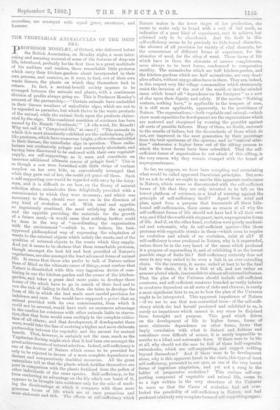MR. CALDECOTT'S " GRAPHIC " PICTURES.
IN time to come, when the comic journals and pictures of this period shall form an important portion of the material on which the historian will rely for his description of its social aspects, Mr. Caldecott will be found to give his country and his epoch a good character. There is no safer or more sure test of what people are than what amuses them, and Mr. Caldecott's pictures please and amuse the great majority. His illustrations to the best known of the children's books that are "for all time," are among the famous achievements of the day, and if there be any " grown-ups who do not enjoy them as much as the children, we pity them. We suspect, how- ever, that the elders enjoy them rather more, in most cases. For instance, the philosophy of the " Three Jolly Huntsmen," who never found exactly what they were looking for, but made the most of what they did find, and their three distinct ways of taking their experiences, are not to be appre- ciated by little folk ; and yet the pictures have not the fault of Crutikshank's ; their moral is not ponderously or fiercely enforced ; the delicate flavour of comicality is not overpowered ; they address the children, with an aside to the elder folk. The Graphic pictures, reproduced in a handsome volume by Messrs. Routledge, are interesting as well as amusing, because they furnish a testimony to the healthy-mindedness, harmless- ness, and good-nature of " the general," which will weigh with the judgment of the future upon us. They go all over Great and Greater Britain ; they are relished everywhere. If the heart of the people was not sound, the hand of this graceful, gall-less artist—as spirituel as any Frenchman, without a touch of the mockery and savagery of French wit—would not knock at it with so unanimous a response. We may fairly imagine an historian of the future, designing to give his readers such a sketch of their predecessors of this age as Macaulay's famous bird's-eye view of England under Charles II., being terribly embarrassed by the Society papers, with their cynical record of fashionable folly, vulgar wealth, and reckless dissipation ; but the per contra will be found consoling, and the " comic " artists will have contributed not a little of that compensating evidence. This is, of course, quite outside of politics. In that great branch of historical investigation, it would be much to be regretted that the writers of the future should be influenced ; for instance, by the Irish cartoons and sketches in Punch, which are simply disgraceful; but on social topics only, what trust- worthy instructors are Richard Doyle, John Leech, and Ran- dolph Caldecott P The latter has not the leisurely elaborateness of Richard Doyle. Who does not remember the Rhine steamer, and has not been fixed by the incomparable " Bore " of the Brown, Jones, and Robinson journey P And Caldecott does not come up to John Leech in his handling of " Mossoo " (perhaps Mossoo is not like what he was when we made his acquaintance at the World's Fair), but he has a charming, kindly, roguish, hinting sort of humour, doing wonders with mere dots, making clothes eloquent in a surprising way, getting an astonishing amount of expression into people's boots, and conveying spooniness in all its phases with such perfection that his elderly admirers blush retrospectively over his betrayals, as they find themselves confronted with the dear, delightful dodges of,—well, let us say twenty golden years ago. What, for instance, could be more comical and convicting than that delicious picture of the pane room at the hotel at Cannes, with all the men taking furtive peeps round the corners of their newspapers at the three charming girls, and their old papa on sentry duty P The faces, the attitudes, the way each man holds his paper, his complacent belief that none of the other men can detect what he is at, the demure unconsciousness of the girls; all are capital. This picture is not better than the rest ; the whole series of flirtation sketches is admirable, but we must protest against one detail of the perfect-felicity tableau with
which it ends. Mr. Caldecott makes two of his three couples of sweethearts (we agree with him in liking the term) walk hand-in-hand, but the third couple adopt that most odious of modern bad-mannerisms, the gentleman passing his arm through that of the lady. Now, this is a custom which ought to be strictly limited to 'Arry, and is intolerable even in him ; we hope Mr. Caldecott will never again lend it his sanction. The best- tempered. man of the present writer's acquaintance has been heard to say that he knows he shall be obliged some day to kick somebody, for doing this thing.
The shaving of the male couutenance in vogue at present gives the comic artist a great pull over his predecessors of the bearded period, and Mr. Caldecott avails himself of this cleverly. He illustrates in the funniest way the " make up " of men's faces by the fanciful use of the razor ; his Scarborough sketches are a triumph of ingenuity and variety in this respect. The dogs, free ones running about, a pet favourite of the pug kind, " that Madame de Pompadour among dogs," as it has been called, deposited iu the ample lap of a blonde Jewess, displayed in a pony carriage much too small for her, and with an efface husband crushed into a corner and emphasised solely by his nose and whiskers ; the donkeys ; the handsome hack that belongs to the young lady riding soberly in front, and followed by her groom, admirably mounted; the young couple whose steeds are hired ; the perambulator with the baby, halted for pocket-handerchief purposes ; the family in the foreground, intent on the construc- tion of a sand castle ; grandpapa, with his trousers turned up, building assiduously, papa and mamma looking on complacently; the younger branches critical, and wanting to do it themselves; the bathing-boxes, the sea, and the great hill with all the houses under it on the other side of the curve, in the picture of Scar- borough Sands, are as good as they can be. The story of "The Rivals," a very ingenious Christmas Number (a kind of produc- tion in which originality has almost ceased to be possible, and is proportionately welcome), is one of Mr. Caldecott's happiest efforts. Every point bears examination,—the mail-coach, the post-chaise, the luggage, the highwaymen, the snow, the beau- tifully-drawn little winter landscape, the prim, old-fashioned hospitable " hall," the fair, graceful, composed women, the fidgety children, the pretty love-story, the resigned boredom of the outsiders, the comic quarrel, and the still more comic " meeting "—with wonderful expression in the four figurps, and in the eyes, which are only dots—the ridiculous ghost, and the perfectly delightful conclusion, when we see the unconscious lover musing over the "fine girl's" miniature, in a box at the "old place" in Fleet Street, while the other frequenters of the tavern share his contemplation, with their intruding heads over the top of the division. "The Wychdale Steeplechase" is all horses, and exceedingly clever. One does not enjoy it as one enjoyed Mr. Briggs's exploits, but perhaps that may be because Mr. Briggs was first in the field. The story here is much more complex, and Mr. Mortgage and Captain Martingale are a rare pair of rascals. They conic to signal grief, of course, and the " finish " is exquisitely comic. The man who would not laugh at the spectacle of Squire Marbury's arrival at the winning-post, alone, on the venerable horse Grey Friar,' to his own profound astonishment, amid the shouting of the boys, while the dismounted competitors con- template him ruefully from a distance, would be capable of "saying he liked dry champagne." We do not care so much for "A Hunting Family," though the dead-beatenness of the return of the Huntbaches to Oak Hall could not be better con- veyed ; and clever as "A Visit to Venice" is, the present writer cannot altogether like it ; because Venice, to one to whom it is still unknown, must always be magnificent, and the realistic-comic side of it a little grievous. " Our Hay- making " deserves unalloyed praise ; it is a lovely little idyll, with a comic flavour which no more vulgarises it than mint sauce vulgarizes lamb—if, indeed, that comparison ought not to be put the other way—and it has all Mr. Calde- cott's most characteristic features and touches. The charming old pair who take a country cottage, with the adjoining meadow of hay grass, and engage the services of three stalwart, hand- some, jolly, young gentlemen as volunteer mowers, to be joined by three lovely young ladies who do the " tedding," are quite pet figures in the artist's gallery, and we are convinced that they are portraits. The simultaneous love-making and hay- making, the sun shining in every sense on both processes, and the final " merry-making, 0 1" when the three couples dance to the music of the old gentleman's clarionot and the old lady's
accordion, are conveyed with equal grace, sweetness, and humour.































 Previous page
Previous page